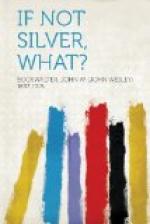“The adoption of bimetallism or of some equivalent remedy, if there be any equivalent remedy, is, I am convinced, a matter of imperative necessity; that is, if the agricultural tenants of Ireland—and I do not limit this to Ireland—are to be saved from otherwise irretrievable ruin. If things go on as they are, even the excellent land purchase scheme, which is associated with the name of Lord Ashbourne, may become, before many years are over, a source of widespread disaster to the tenants who have purchased under it.”
Again, in view of the steady and dangerous increase in the burdens of the obligations entered into under either of the acts referred to, by reason of the continued enhancement in the price of gold, he says:
“The bimetallists may be right or they may be wrong; but, at all events, if they are right, then it is noticeably plain that the Irish tenants who have the misfortune to have their rents fixed for terms of ten or fifteen years under the Act of 1881, and in much the same way the Irish tenant purchasers who have the misfortune to have found themselves saddled with the obligation of making annual payments fixed for forty-nine years, are simply sliding down an inclined plane with bankruptcy awaiting them at the bottom of it.”
And again:
“The point, as I have already stated it, is that so long as our monetary system remains what it is, every one who is placed under an obligation to make yearly payments of a fixed amount of money is thereby placed under a burden which is growing heavier from year to year.”
In discussing the question of variability in the purchasing power of gold, he says:
“The reason of the liability to fluctuation in the purchasing power of the sovereign is plain: When gold rises in value a larger quantity of any other commodity, say of corn, of meat, of butter, or of cloth, will have to be given in exchange for any given quantity of gold, such, for example, as the quantity contained in a sovereign. On the other hand, when gold falls in value a smaller quantity of any other commodity, say of corn, of meat, of butter, or of cloth, will suffice to obtain in exchange any given quantity of gold, such as that which is contained in the sovereign. It is an obvious inference that our gold coinage, however useful as a medium of exchange, does not furnish us with a standard of value fixed and unalterable. It does not furnish us, for example, with such a standard as the yard is of length or as the pound troy is of weight. The popular notion that the pound sterling constitutes a fixed standard of value is merely a popular delusion. The sole foundation for that delusion manifestly is that in these countries the values of all commodities are commonly stated in terms of a pound sterling; in other words, in pounds, shillings, and pence; a shilling being a twentieth part of the pound, and a penny the twelfth part of that again.




